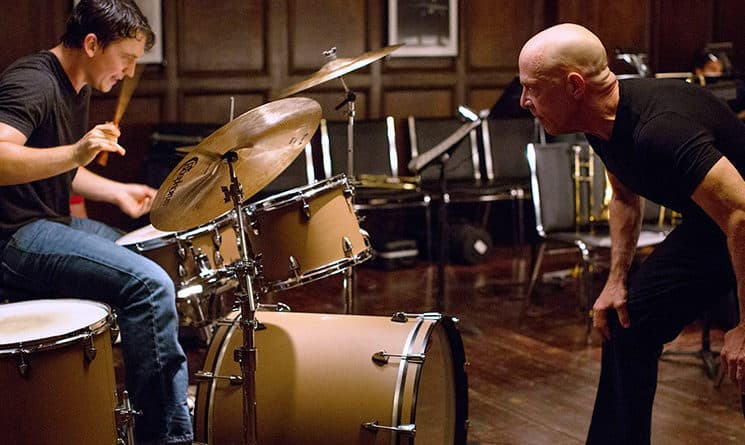In Whiplash, J.K., Simmons, well-known as the most recognizable guy who was in that thing to ever escape your memory, is simply unforgettable. As Terence Fletcher, a Juilliard-level jazz band instructor, he is loud and hard and unrelenting. He’s got the poise of a dancer, the mouth of a longshoreman, and he’s stacked like a steam train. His rehearsal room is nothing less than a forge and he is both the smith and the hammer that pounds raw material into steel. His students, it turns out, are the raw material, and if he senses they are soft, yeah, he’ll hit them. And he really believes in what he’s doing. He is one of the most three-dimensionally conceived villains to stalk the screen since R. Lee Ermy got the job done in Full Metal Jacket. His performance, simultaneously nuanced and balls-out insane, is captivating, terrifying, and the primary reason to see Whiplash.
That’s because otherwise, the movie is just OK. Pretty good, even. Technically, for a movie that was shot in only 19 days, it’s actually something of an achievement. The camerawork is an impressive departure from common American style, employing focus, motion, and transitions between shots to describe and underscore what’s happening. This visual vocabulary has become increasingly lost to U.S. audiences, and it shows much the same promise as Edgar Wright’s early work from the U.K. This is a very hopeful sign.
However, for all its scrappy indie spirit, and beyond its laudable technical aptitudes, at its core, the film still reeks distinctly of a student work. Based on writer/director Damien Chazelle’s need to process his experience as a tortured music student in high school, the story follows the singular viewpoint of a privileged young white dude with a little talent and a lot of drive. If we are to imagine the main character, a young hotshot percussionist played in full boyish John Cusack mode by an angel-faced Miles Teller (Divergent), is a reflection of the filmmaker, then we are to understand that the filmmaker is actually a juvenile, self-centered little prick. The movie bleeds narcissism, and appears so driven by its own tunnel vision that it neglects to even notice how caught in its own orbit it is. The narrative is claustrophobic and myopic in all the same ways that your high-school poetry was. No offense, but go on — dig your shoebox out of the closet and read some of that shit. It’s interminable.
The fact that Chazelle received an Oscar nomination for best picture before his 30th birthday — joining an elite club that includes only two other directors, Orson Welles and John Singleton — seems less a celebration of his talents than of some law of diminishing expectations. For all he has going for him, it’s remarkable how much he misses. Seriously, who makes a movie about aspiring to jazz greatness without even one mention of the magic of collaboration? Far worse, who makes a movie about aspiring to jazz greatness without making room for even one significant black character? It blithely skids right past curious into arrogance, ignorance and even insult. It could be argued that these omissions might be acceptable in the context of a young artists’ early steps toward self-discovery, but in an internationally distributed feature film, that should really be inexcusable. Somehow, the Academy of Motion Picture Arts and Sciences appears happy to look the other way.
There’s a rare quiet moment in the film where Fletcher, a maker of arrows and throttler of dreams, squares off with his harrowed young apprentice and explains, There are no two words in the English language more harmful than ‘good job.’
Well, Chazelle, what can we say? Good job.
Whiplash is playing Wednesday night, Jan. 21, at 7 p.m. at The Music Hall, 28 Chestnut St., Portsmouth, 603-436-2400.

